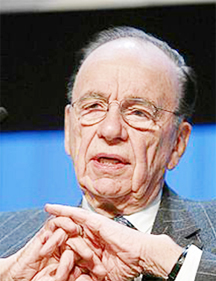LONDON, (Reuters) – The British government endorsed a move in parliament to block Rupert Murdoch’s bid for broadcaster BSkyB yesterday, casting more doubt on his hopes to expand in television despite a widening scandal over phone-hacking by one of his newspapers.

By joining a phalanx of resistance to the global media magnate that now includes all Britain’s main parties, Prime Minister David Cameron showed how far Murdoch, long feared and courted by both left and right as a kingmaker, may be damaged by outrage at the past week’s allegations of criminal journalism.
The U.S.-based media magnate, his son James and Rebekah Brooks, the News International executive and former editor at the centre of the storm, were summoned to answer questions next week by a parliamentary committee which on Tuesday grilled police chiefs on failures in earlier inquiries into the affair.
Murdoch, 80, is in London to deal personally with a crisis that has seen him close down the top-selling tabloid News of the World to try to save his pay-TV ambitions. But it was unclear whether he or his two lieutenants would agree to appear before a legislative committee likely to be uniformly hostile.
Questions they face focus on allegations that for years, News of the World journalists and hired investigators hacked into the voicemails of thousands of people, some of them victims of notorious crimes, in search of stories, and that they also bribed police officers for information.
Dozens of such allegations have been aired over the past week. The latest included former Labour Prime Minister Gordon Brown saying Murdoch papers had hired criminals to make investigations at a time they were running stories about his personal finances and the illness of his newborn son.
Two of those papers, the Sunday Times and the Sun, defended their reporting. The Sun hit back in a front-page story in its Wednesday edition over a story it broke in 2006 that Brown’s infant son was born with cystic fibrosis.
The Sun said the story was not based on any hacking of medical records and came from information brought to the daily — then edited by Brooks — by a member of the public. It said Brown was then approached to discuss the information and that it handled the story “sensitively and appropriately”.
“On receipt of the information, The Sun approached Mr Brown and discussed with his colleagues how best to present it,” it said. “We are not aware of Mr Brown, nor any of his colleagues to whom we spoke, making any complaint about it at the time.”
BID IN DOUBT
News International, the British newspaper arm of U.S.-listed News Corp , has said it is cooperating with inquiries relaunched by police in January. But it had no comment on the decision by Conservative leader Cameron to vote on Wednesday for a non-binding motion proposed by the Labour opposition urging Murdoch to withdraw his bid for BSkyB .
The chairman of the parliamentary committee that wants to question the Murdochs said it had no power to order them, as American citizens, to attend, although they could compel Brooks, the 43-year-old British former editor of the News of the World whom Rupert Murdoch seems determined to defend, to do so.
Some analysts played down the significance of the vote for News Corp, noting that the company had already accepted a referral this week to the competition watchdog, which means a delay — some called it a “respite” — of many months for a deal which critics say would give Murdoch too much power in Britain.
Others suggested the heavy political fallout meant that even a favourable outcome of that review would not necessarily clear the way for the takeover.
Labour leader Ed Miliband said on calling Wednesday’s vote: “The best way of achieving our objective, which is to make sure that this bid cannot go ahead while the criminal investigation is going on, is for Mr Murdoch to withdraw the bid.”
Ministers had looked embarrassed by having already given their provisional blessing to Murdoch’s offer to buy out the 61 percent of pay-TV group BSkyB he does not already own, for some $14 billion. That approval left the fate of the deal largely in the hands of independent officials, rather than politicians.
